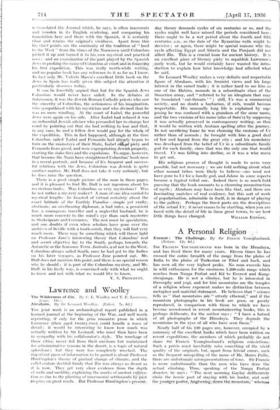Lawrence and Woolley .
Abraham. By Sir Leonard Woolley. (Faber. is. 6d.)
THE joint work is an archaeological report published in a learned journal at the beginning of the War, and well worth reprinting, if only for the grins romantic prose in which Lawrence (then aged twenty-two) ,could handle a mass of detail ; it would be interesting to know how much was actually written by Sir Leonard, who must then have been in sympathy with his collabOrator's style. The .iyreekage of these cities, never fed from their environs but maintained for administrative reasons in the desert, is a topic of natural splendour ; but they were too completely wrecked. The important piece of information to be gained is about Professor Huntingdon's theory of gradual change of climate, and the collaborators decided firmly that Zin was always as desert as it is now. They get very clear evidence front the depth of wells and suchlike, explaining the marks of ancient enitira- tion as due to the planting of uneconomic settlementS by past
empires on great roads. But Professor Huntingdon's present- .
day theory demands cycles of six centuries or so, and the cycles might well have missed the periods considered here ; there ought to be a wet period about the fourth and fifth centuries A.D., so the date of the Byzantine wells might be decisive ; or again, there might be special reasons why the cycle affecting Egypt and Siberia and the Punjaub did not affect Zin. This iss-a crucial issue for ancient history. It is an excellent piece of literary piety to republish Lawrence's _early work, but he would certainly have wanted the intro- duction to explain how later knowledge had affected what he said.
Sir Leonard Woolley makes a very defmite and respectable figure of Abraham, with his feminist views and his large interest in the camel trade ; it is rather hard to see him as one of the Habiru, nomads in a subordinate class ,of the Sumerian army, and " referred to by an ideogram that may be translated cut-throats ' " ; still, Ur. was a commercial society, and no doubt a barbarian,' if, rich, would become respectable. His unusually long life is explained by sup- posing he was confused with a grandson of the same name, and the two. versions of his naine:(also of .Sara's) by supposing it was actually preserved in contemporary writing, so that it would be written with. Arabian spelling after the journey. In not sacrificing-Isaic he' was chdosing the customs of Ur rather than of nomads ; he brought with him a good deal of law and legend from the great city ; and his monolatry was developed from the belief of Ur in a subordinate family god for each family, since that was the only one that would travel. Ur was falling into decline, so it was a wise move
to get out. , .
religious process of thought is made to seem very possible, but not necessary ; we-are told nothing about what other nomad 'tribes were likely to believe—one need not have gone to Ur for a family god, and Jahwe in some aspects became a typical tribal one. Indeed there is so much bold guessing that the book amounts to a charming reconstruction of myth ; Abraham may have been like that, and there are fascinating snatches of real evidence, but this sort_of work of popularisation, admirable in itself, is in danger of playing to the gallery. Perhaps the finest parts are the descriptions of the actual Ur; it never ceases to be startling, when you are faced with the detail of life in these great towns, to see how












































 Previous page
Previous page